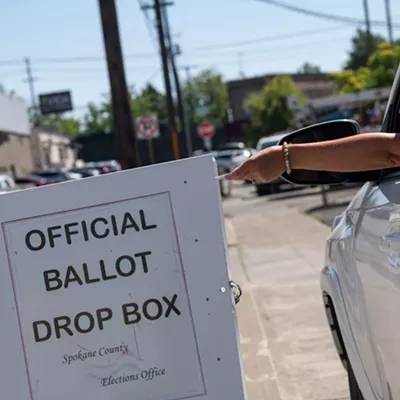Ants scurry around underfoot, lugging bits of fluff, proud of their efficiency, contributing to the anthill, swearing allegiance to their leader. Little symbols of insignificance and futility. We laugh ruefully, feeling an urge to rub out the little buggers with the soles of our shoes.
That's pretty much the divine perspective on jihads and the troubles in Ireland and the intifadeh, the invasions of Grenada and the Falkland Islands, the Northern Alliance. And U.S. support for the Northern Alliance, which reverses our indifference to them back when we actually were supporters of the Taliban, because they stood for anti-Soviet power, and... But then we don't like it so much when the justice of our own causes are called into question.
Neither do the vermin -- sorry, the red ants and the yellow ants -- in Insect Comedy, the joint production of the SFCC Revelers Drama Club and Express Theatre for Youth-Northwest, which opens Thursday in the Spartan Theater on the Spokane Falls Community College campus.
This satire (known more dryly as The Insect Play in some translations from the original Czech) was co-written in 1922 by two brothers, Josef and Karel Capek (pron. "CHAH-peck"). Just four years before, at the end of World War I, Czechoslovakia had emerged from the ruins of the Austro-Hungarian monarchy. Nationalistic pride and relative prosperity buoyed the new nation; perhaps the spoils of war improved the Capeks' lot. What they didn't know, however, was that two decades later, less than a year before Hitler's invasion of the Czech homeland, Karel would be dead. Even worse, after the invasion, Josef Capek would be sent to a German concentration camp. In April 1945, the final month of the war, just weeks before the liberation of the camps, he died at Bergen-Belsen.
Trench warfare and the dying-out of a generation spurred the Capek brothers to write an anti-war play; they couldn't envision the message's personal urgency. Director William Marlowe still feels it, though, even 80 years later. While he considers that "the message of the play is to embrace life," he feels that "it is also certainly an anti-war play, and a play that opposes man's inhumanity to man."
When he talks about this script and how rehearsals for it are going, Marlowe's passion for this play is apparent. "My wife Sara had done [Insect Comedy] at the University of Florida years before," Marlowe relates, "so when we were in Tucson together -- I was doing my MFA at the University of Arizona -- she suggested that I try it. She said, 'Bill, you're good working with large casts.' So I read it, and it really captured my imagination. It's a play that's full of challenges -- its size, its costumes -- but the issues it raises are profound."
The Capeks' satire does indeed present challenges in terms of its stylistic and emotional shifts -- but first, you have to conquer the logistics. Marlowe auditioned 98 people for the 41 parts in the cast, 10 of them for kids (which is where Express Theater for Youth-Northwest comes in). The youngest actor is eight years old; the oldest, set to play the central role of The Vagrant, is Interplayers veteran and 72-year-old Coeur d'Alene resident Ed Cornachio.
Yet even before Marlowe could begin to deal with the scope of a show such as this, first he had to get it scheduled for production.
"This is my fifth attempt to do this play. At other schools, I tried it, and first there was no space; then there was no budget, then they lacked the technical capacity, and so on. So when I had the chance to do it here, I leaped at the opportunity."
A prologue about the senselessness of killing nature in order to preserve it and an epilogue celebrating life (but in an ironic context) are sandwiched around three acts -- about hedonistic butterflies, rapacious flies and beetles, and war-mongering ants. Sound silly? In places, it's dead serious.
After all, most of us will lord it over the little guy, confident that we're doing right as God gives us to see the right. Back in the 1740s, Jonathan Swift knew as much, and expressed it in a poem which the Brothers Capek employ as epigram for their "entomological review" of a play: "So, Naturalists observe, a flea / Has smaller fleas that on him prey; / And these have smaller still to bite 'em, / And so proceed ad infinitum."
Marlowe notes how the play chomps bites out of our self-regard, catching us unaware with its satire: "The play gets stronger and stronger as it goes along, and then you get to the epilogue and you say, 'Wow!' The Capeks very carefully lull us; at first, we think, oh, it's going to be a very talky kind of play. But then they take you into another world -- and that's the first surprise in the play."
With its oversize cattails and gauzy backdrop, its giatn tulips and scampering "insects" with goggle eyes and droopy antennae, Marlowe's production seeks to take us to a different place. "And then we come to the ants in Act Three, and it all seems absurd -- until we come to the big battle. And then it all turns tragic."
The Capeks' play may seem as innocent as a beetle dawdling in the sunshine -- until it turns out to be a scorpion, until it rears up and bites you.
Insect Comedy runs at SFCC's
Spartan Theater, Bldg. 5, 3410 W. Fort George Wright Dr., from Nov. 29-Dec. 2 and Dec. 6-8 at 7:30 pm, with a Dec. 2 matinee at 2 pm. Tickets: $5. Call: 624-8073.
















